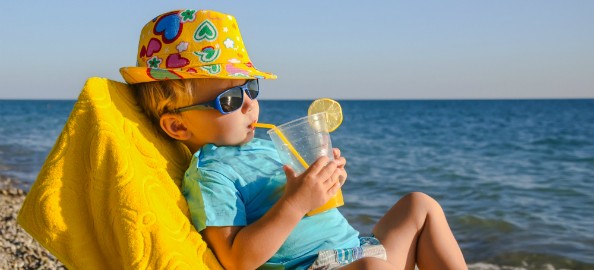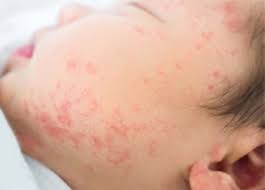It's not fair: your baby is only a few weeks old and suddenly he has acne. You probably weren't expecting it, at least if it's your first baby, before puberty. Other mothers or the midwife will tell you that it is baby, newborn, or infant acne.
Baby acne: a natural reaction to hormonal changes
It is true that when it comes to pimples, it is a special form of acne vulgaris, which we suffer from more or less as teenagers. What is not correct is to use these three terms as synonyms: acne in newborns or babies is completely harmless and usually appears during the first weeks of life.
While infant acne develops between the third and sixth month of life and requires medical treatment.
Baby acne is a completely natural reaction to hormonal changes. The medical terms for this are acne neonatorum y neonatal exanthema. The red pimples with small yellow dots in the center appear first on the face and then spread to the rest of the body.
Some children suffer from it so badly that they sometimes seem covered in crumbs. The rash is painless, it does not itch and heals without leaving a scar. About 20% of babies suffer from newborn acne. It always begins during the first weeks of life and is usually linked to a growth spurt.
If acne already appears between the tenth and the 14th day of life, the causes are hormonal influences that have already started long before the due date. During the last trimester of pregnancy, the mother's body releases hormones more intensely to promote the maturation of the lungs and the development of the baby's immune system, among others, which consequently affect his sebaceous glands.
Many children develop sebum reservoirs in the first days and weeks after childbirth on the forehead and nose, the baby's acne. Between the third and sixth week of life, their hormonal balance changes, which can also cause acne. In addition, some recent American studies have found that certain medications taken while breastfeeding can cause acne in newborns.
Baby boys struggle more with postpartum hormonal changes and the influence of maternal hormones during pregnancy than little girls, which is why they suffer from baby acne more frequently. The rashes can get worse with an increase in temperature, that is, from fever or clothes that keep too warm, as well as with skin irritation.
Newborn Acne Skin Care: The Least The Better!
Baby acne hardly ever causes a problem, so it doesn't need to be treated. However, if you are worried, talk to the midwife or pediatrician to reassure you. The likelihood that your child will have serious hormonal skin problems during puberty has nothing to do with newborn acne.
Midwives and experienced mothers know that with skin care to cure baby acne, the less there is, the better. Ideally, wash the affected areas only with lukewarm water and several times a week with a mild moisturizing baby soap.
Acne has nothing to do with dirt or dust, so there is no need to intensely rub the baby's delicate skin. For skin care, midwives and pediatricians sometimes recommend using calendula ointment or olive oil which, by the way, is the preferred skincare product for children with dermatitis. atopic. Another home remedy is to apply a little breast milk to the pimples.
Too much oils and lotions can make baby's acne worse. Never use products that are perfumed or contain paraffin.
Do not try to pop the pimples either, as it is very painful for the baby and can cause infections. Products for adolescent acne and ointments with antibiotics or cortisone are also prohibited to treat acne in newborns. The most important thing with these completely natural symptoms is to be patient, because in two or three months the rashes will go away on their own.
Infant acne: it depends on predisposition and usually requires treatment
Even though infant acne and newborn acne appear to be the same, their causes are not the same. Doctors attribute the cause of infant acne to a hereditary predisposition, which usually causes severe acne breakouts during puberty.
Normally, infant acne is not seen until the third through sixth month of life. She usually itches a lot, which causes the children enough pain. Plus, it lasts much longer than baby acne.
The treatment for infant acne is decided by the doctor, who will prescribe anti-inflammatory or antibiotic preparations depending on the level of severity. If left untreated or too late, acne pustules can leave unsightly scars.
How can you help your baby with acne
Important: Neither baby acne nor infant acne indicates that you have done anything wrong with the care or feeding of your child. Hypoallergenic baby foods do not help acne.
However, acne worsens with skin irritation. If the baby spits out milk, drools, or itches at the pimples, the rashes get worse. For this reason, always give her a clean, dry tissue to keep her face as dry as possible.
If your baby has infant acne, the itchiness causes him to scratch a lot and very hard in the affected areas. If you absolutely can't stop scratching, put on light cotton gloves. Make sure your baby's environment is not smoky, as tobacco smoke is very irritating to the skin and causes acne to spread.



0 Comments